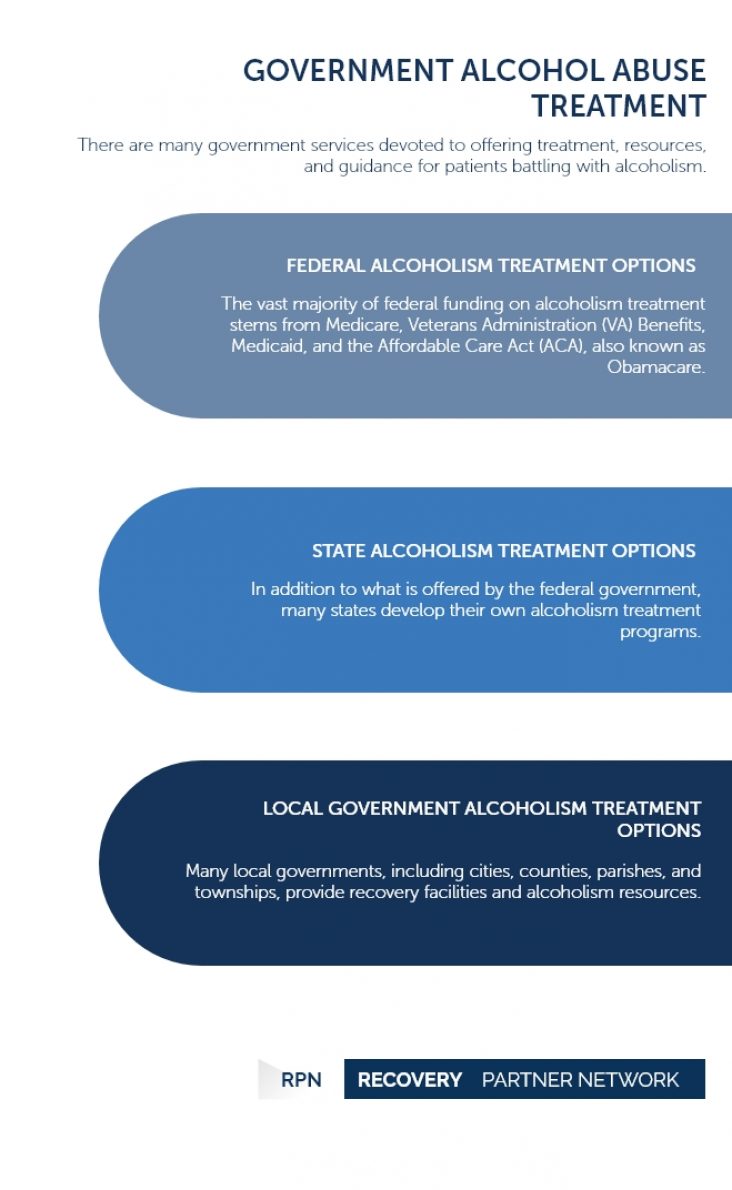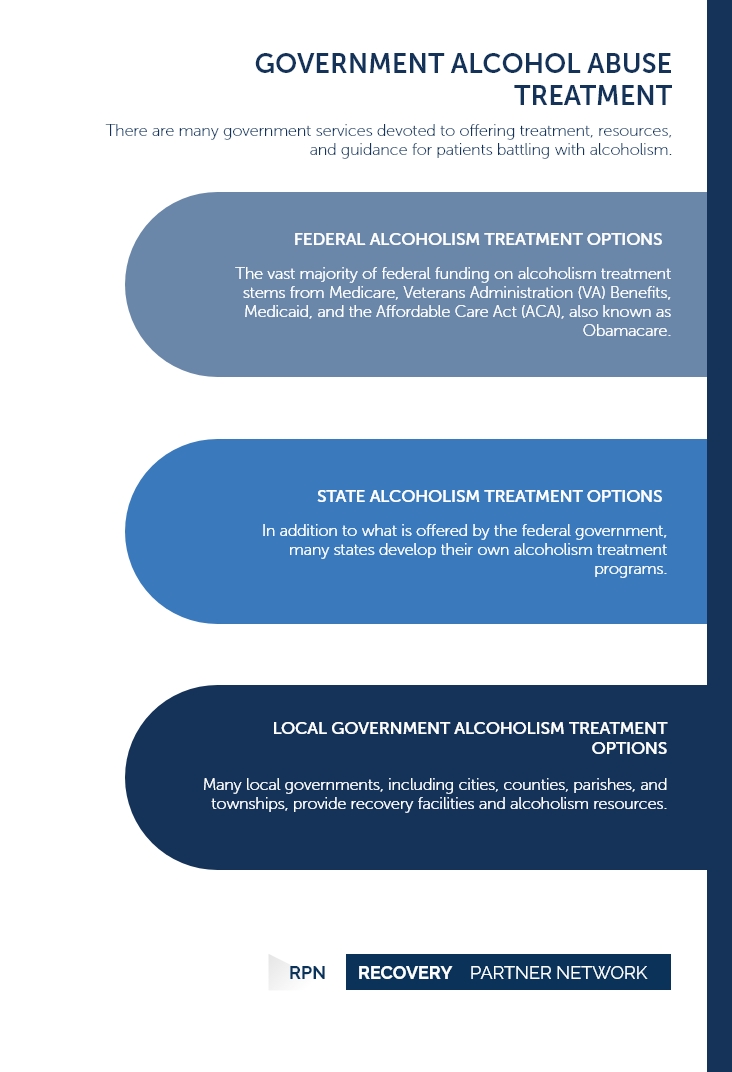There are many government services devoted to offering treatment, resources, and guidance for patients battling with alcoholism.
Government Alcohol Abuse Treatment
Government Alcohol abuse treatment | Table of Contents
Government Alcoholism Treatment
About 3 million Americans seek assistance for drugs and alcohol abuse each year. Unfortunately, that is only 10% of the 22.7 million Americans who require treatment, a number that rises every year.
Alcoholism remains a major issue in the United States, and all levels of government (federal, state, and local) include systems devoted to overcoming this disease. As early as 2005, government agencies invested a cumulative of 468 billion dollars each year on alcohol and drug abuse associated expenditures, which is more than 10 percent of all government expenditure. Although several services are focused on helping individuals recover from alcohol, many concentrates on helping families of AUD patients and communities affected by substance abuse. Some such services are structured to reduce the misuse of drugs better with programs that offer a wide range of subsidized treatment to school education.
One of the main government agencies delivering alcohol treatment resources is the Substance Abuse and Mental Health Services Administration, best known as SAMHSA. SAMHSA works to decrease substance misuse rates through a range of campaigns and projects, including providing one of the most detailed and commonly used lists of treatment programs.
FAQ
- What are the steps taken by the government to reduce alcohol consumption?
- How can you prevent excessive alcohol consumption?
Strategies taken by the government to reduce alcohol consumption include pricing policies, drink-driving policies, and countermeasures, regulating the availability of alcohol, marketing restrictions on alcoholic beverages, and regulations on where alcohol is sold.
Following the U.S. dietary guidelines set for moderate alcohol consumption can prevent the excessive consumption of alcohol.
Federal Alcoholism Treatment Options
Substance abuse has been one of the most critical issues affecting every administration ever since the early 20th century. The federal government spends billions of dollars per year in the war against drugs and alcohol abuse. Although most of this is expended on law enforcement, much more is expended on providing healthcare services and treatment. While there are many different programs, the vast majority of this funding stems from Medicare, Veterans Administration (VA) Benefits, Medicaid, and the Affordable Care Act (ACA), also known as Obamacare. Although many rehab centers accept government funding, there are some that do not, so it is important to verify before initiating therapy.
Regrettably, alcoholism is extremely common in veterans, many of whom start drinking excessively to deal with the elevated levels of stress and trauma encountered in the military. The VA offers programs primarily tailored to cope with alcohol abuse that includes treatment and rehabilitation for patients with co-occurring disorders like post-traumatic stress disorder (PTSD), chronic pain, depression, and sleep disorders. VA programs provide daytime, night-time, weekend treatment options and residential care.
The Affordable Care Act lists mental health and addiction treatment as one of its ten core health benefits. This ensures that individuals can no longer be refused coverage or charged more if they suffer from alcohol addiction or other similar disorders. Each ACA package includes various services, such as evaluation, medication, detoxification, detox, and recovery.
Medicare and Medicaid are federal and state-funded insurance services that cover alcohol treatment. Medicare is intended for low-income families, particularly those falling below the poverty line. Medicaid is intended for American citizens who are 65 years of age or older and individuals with disabilities. Medicare and Medicaid coverage and eligibility differ from state to state. For example, a few states cover more recovery days than others.
State Alcoholism Treatment Options
In addition to what is offered by the federal government, many states develop their own alcoholism treatment programs. Every state is different, and the degree and nature of facilities vary significantly from one location to the next. State care facilities often have a lengthy waiting list as they are often highly sought out due to their accessibility and low cost. However, some states provide interim care services that help individuals with alcohol use disorder enhance their lives and wellbeing while preparing for more intensive treatment.
Local Government Alcoholism Treatment Options
Many local governments, including cities, counties, parishes, and townships, provide recovery facilities and alcoholism resources. This is particularly true in large metropolitan areas. Generally, local government recovery options for alcoholism are less robust than state and federal services. Most programs are operated under the local health department in each region.
Tips for Selecting Alcohol Treatment
Patients must obtain as much information as possible regarding the program or the services before making any decision. First-hand knowledge of the process, experience, and personal opinions by previous patients can be vita in determining the right treatment program for you.
Here are some questions to help guide your decision:
- What type of therapy is offered by the program or provider?
- Do they provide personalized care?
- What is expected of the patient?
- Is the effectiveness of treatment measured?
- How does the provider or program manage relapses?
It is necessary to assess whether the facility provides commonly existing approaches or depends on a particular solution. You will want to learn whether the service or provider is providing medication and whether they provide treatment for co-occurring disorders.
Matching an individual with the right treatment is critical to his/her success in recovery. There is no one treatment that works for all, as each individual’s needs and requirements vary from one another.
You should be aware of what is expected of patients before you determine what treatment fits you best.
By determining whether and how the service or provider measures their success rate.
Alcoholism is a relapsing disease, and the chances of experiencing a relapse remain high. Find out how each program and provider address such issues.
Advice for Friends and Family Members
Just as individuals with alcoholism require treatment for their addiction, members of their family and friends will also require guidance and support when dealing with such situations. Caring for a person with alcohol issues may be difficult and sometimes traumatizing. Many such members may find it difficult to support their loved one’s suffering from addiction due to neglect, abuse, or even repeated disappointments experienced by the hands of the addict. For that reason, it is vital that friends and family of addicts seek counseling and support to maintain a healthy relationship with the addict and to improve their own mental health and wellbeing.
Family and friends of an addict can also suffer from depression, anxiety, and trauma that require psychological support. Just as an addict is responsible for his/her recovery, you, too, are responsible for your own health and wellbeing.
Although support from family and friends remain crucial during addiction recovery, it is also vital that their actions do not feed the addiction. Hence adequate knowledge and guidance acquired by friends and family on how best to deal with an addict and the situations that may arise can make things less complicated for everyone involved. Remember, reforming deep habits is challenging, time-consuming, and requires repeated efforts.
Recovery Partner Network
We aim to educate and empower. If you feel our library of resources does not cover your specific need, reach out to us, and we would be happy to help.
STATISTICS
© Copyright 2024


